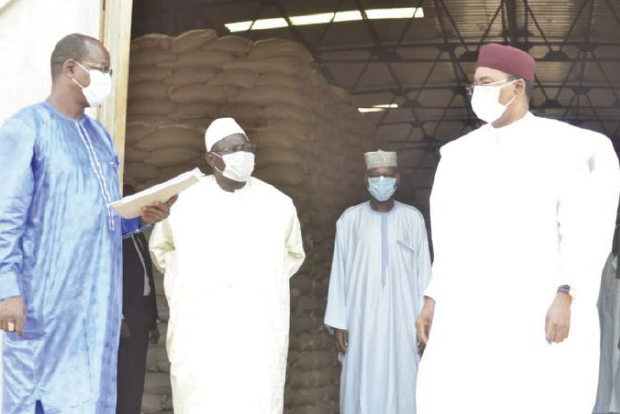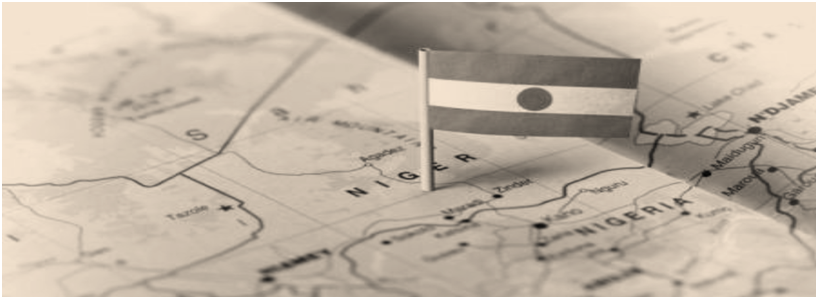
Weekly Highlight
- (COVID-19) Niger: extension of the closure of schools until May 3 (minister)
- Niger to Receive $13.95 Million for COVID-19 Response
- (COVID-19): The international NGO ASB donates the materials of 6.5 million FCA to the city of Niamey
- Niger exchange rate – Exchange rates West African CFA franc – USD = 604.059 XOF XOF= 0.00165547 USD
EXECUTIVE SUMMAR
(COVID-19) Niger: extension of the closure of schools until May 3 (minister)
Faced with the increase in the number of positive cases of COVID-19 in the country, the closure of schools and universities established on March 20, has just been extended until May 3, renewable, throughout the country. national territory, by decision of Yahouza Sadissou, Nigerien Minister of Higher Education and coordinator of the ministries in charge of Education, we learned on Saturday in Niamey. According to an official report made public Saturday by the Nigerian Ministry of Health, 639 patients were declared positive for COVID-19, among which 507 are being treated, 113 left cured, while 19 died, said the press release. “However, the defense of dissertations and theses can resume in universities, institutes and grandes écoles in scrupulous respect for the barrier gestures decreed by the government,” said Sadissou.
Niger to Receive $13.95 Million for COVID-19 Response
The World Bank approved today a $13.95 million to prevent, detect and respond to the threat posed by COVID-19 and strengthen national systems for public health preparedness in Niger. The Niger COVID-19 Emergency Response Project will support the government’s plan by supporting rapid procurement of critical medication and equipment needed for treatment of coronavirus infections. In addition, the project will support the government’s campaign to mitigate the spread of coronavirus by raising awareness throughout the country of how to prevent the spread of the disease. The project will focus on strengthening preparedness through early screening, detection and treatment of patients; as well as as well as improved laboratory capacity and surveillance.
(COVID-19): The international NGO ASB donates the materials of 6.5 million FCA to the city of Niamey
As part of the fight against the coronavirus pandemic, the Chef de Mission of the international NGO ASB Mrs. Karine Dyskiewicz gave a donation of materials to the president of the special delegation of the city of Niamey, Mr. Mouctar Mamoudou this Thursday, 16 April 2020 at the city hall of Niamey. The head of mission of the NGO ASB indicated that this gift, worth 6.5 million CFA francs, consists of 600 flaps, 635 cartons of soap and 650 kettles intended for the city of Niamey. For his part, the president of the special delegation from the city of Niamey Mouctar Mamoudou thanked the NGO ASB for this gesture and welcomed the relevance of the choice, namely the kettles, which is an important and essential basic means for the search for property of hand washing, before indicating that water and soap is for us the best way to wash and make hands clean and also the masks that can be reused several times that has been made locally.
Clash between gold miners in south-west Burkina Faso leaves one dead on the Burkina side and 13 injured on the Niger side
A Burkinabé killed and 13 Nigeriens wounded, three of whom were shot. This is the outcome of a fight that pitted gold washers from the two countries on April 5, 2020 on the gold panning site of Diébougou in the Southwest region of Burkina Faso, located 300 km from Ouagadougou, said the permanent secretary of the high council of Nigeriens abroad, Boubé Yayé, quoted by the daily Sahel. Following these clashes, Nigerian gold panners estimated at 2807 in this locality preferred to leave the site to go to Ouagadougou for fear of reprisals. This was despite the measures taken by the region’s governor to bring order to the site. As of this date, according to figures released by the permanent secretary of the Nigerian High Council abroad, only 225 people have been able to arrive in Ouagadougou. The rest were stranded in three locations. Namely, Kokologho, Sabou and Tita.
USEFUL INFORMATION
List of holidays in Niger 2020
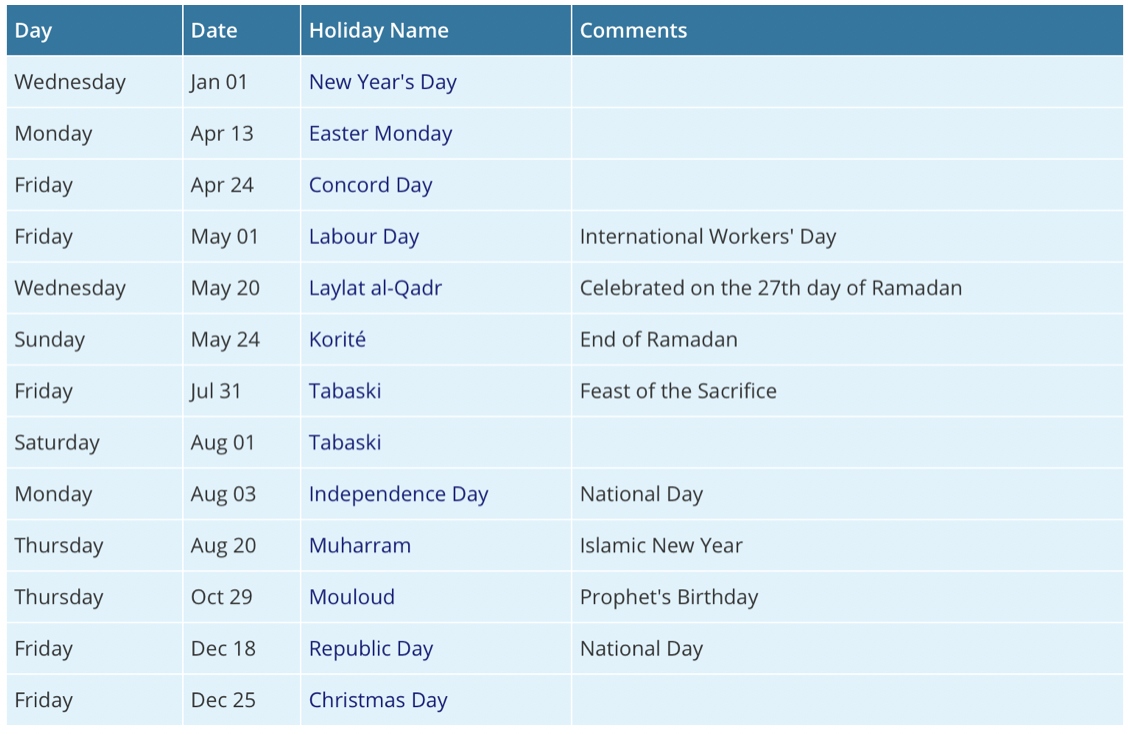
Exchange rates West African CFA franc
According to our most recent information (20th April 2020) the West African CFA franc has the following exchange rates.
The exchange rate from your own bank or credit card company will differ somewhat from the exchange rates as mentioned above. Your bank or credit card company might also apply additional international charges.
| USD = 604.059 XOF | XOF= 0.00165547 USD |
| EUR = 655.957 XOF | XOF= 0.00152449 EUR |
| **As at 20 April 2020 |
FREQUENTLY ASKED QUESTIONS ABOUT CORONA-VIRUS DISEASE (COVID-19)
COVID-19 Basics
Q: What is COVID-19?
A: COVID-19 is a virus strain, first identified in Wuhan, Hubei Province, China, that has only spread in people since December 2019.
Health experts are closely monitoring the situation because little is known about this new virus and it has the potential to cause severe illness and pneumonia in some people.
Q: How does COVID-19 spread and what are the symptoms?
A: COVID-19 is primarily spread through respiratory droplets. That means to become infected, you generally must be within six feet of someone who is contagious and come into contact with these droplets. It may be possible to get COVID-19 by touching a surface or object that has the virus on it and then touching your mouth, nose, or possibly their eyes, Symptoms of COVID-19 appear within two to 14 days after exposure and include fever, cough, diarrhea and shortness of breath.
Q: How long does it take for symptoms of the COVID-19 to appear?
A: The CDC believes that symptoms of COVID-19 may appear in as few as two days, or as long as 14 days after exposure.
Q: How is COVID-19 treated?
A: There is currently no FDA approved medication for COVID-19. People infected with the virus should receive supportive care such as rest, fluids and fever control, to help relieve symptoms. For severe cases, treatment should include care to support vital organ functions.
Prevention
Q: Is there a vaccine?
A: Currently, there is no vaccine available.
Q: How can I best protect myself?
A: Practice the following:
- Wash your hands with soap and water for at least 15-20 seconds. If soap and water are not available, use a hand sanitizer with at least 60% alcohol.
- Avoid touching your eyes, nose and mouth with unwashed hands.
- Avoid close contact (within 6 feet) with people who are sick.
- Stay home when you are sick.
- Cover your cough or sneeze with a tissue, then throw the tissue in the trash.
- Standard household cleansers and wipes are effective in cleaning and disinfecting frequently touched objects and surfaces.
- It’s currently flu and respiratory disease season and CDC recommends getting vaccinated, taking every preventive actions to stop the spread of germs, and taking flu antivirals if prescribed.
Q: Should I wear a face mask? Will that help protect me?
A: If you are sick: You should wear a facemask when you are around other people (like sharing a room or vehicle) and before you enter a building. If you are not able to wear a facemask (for example, because it causes trouble breathing), then you should do your best to cover your coughs and sneezes, and people who are caring for you should wear a facemask if they enter your room.
If you are not sick: You do not need to wear a facemask unless you are caring for someone who is sick (and they are not able to wear a facemask). Facemasks may be in short supply and they should be saved for caregivers.
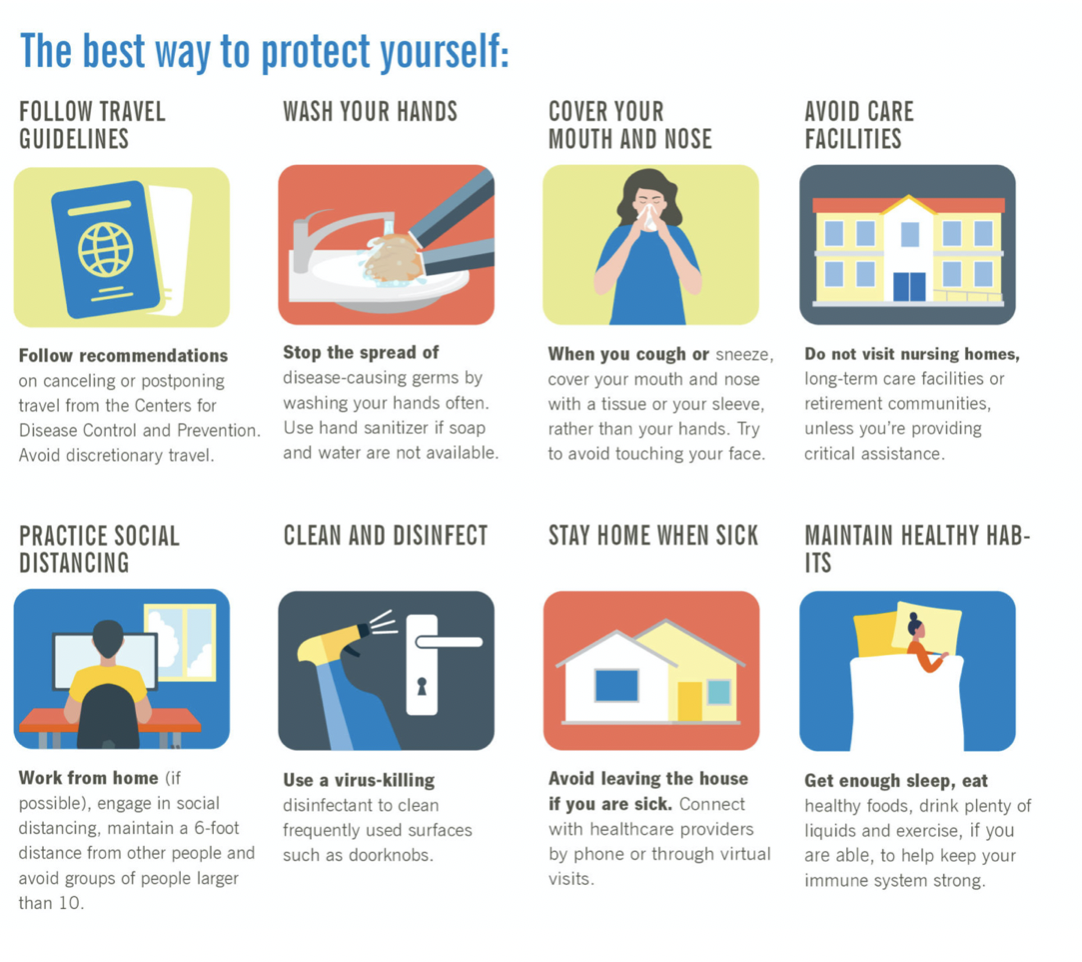
MEDICAL REQUIREMENTS AND INFORMATION
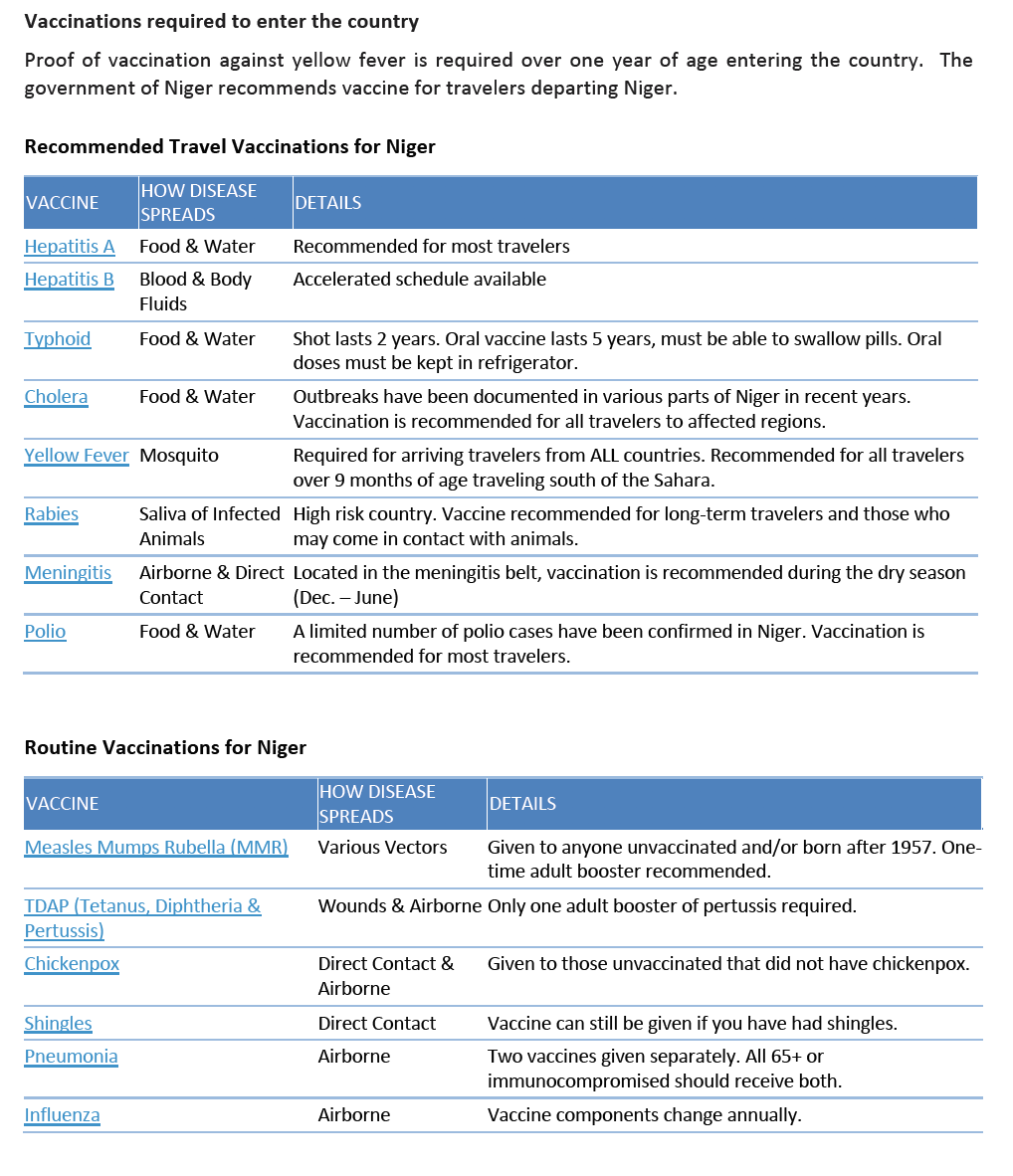
NIGER SECURITY & RISK LEVELS
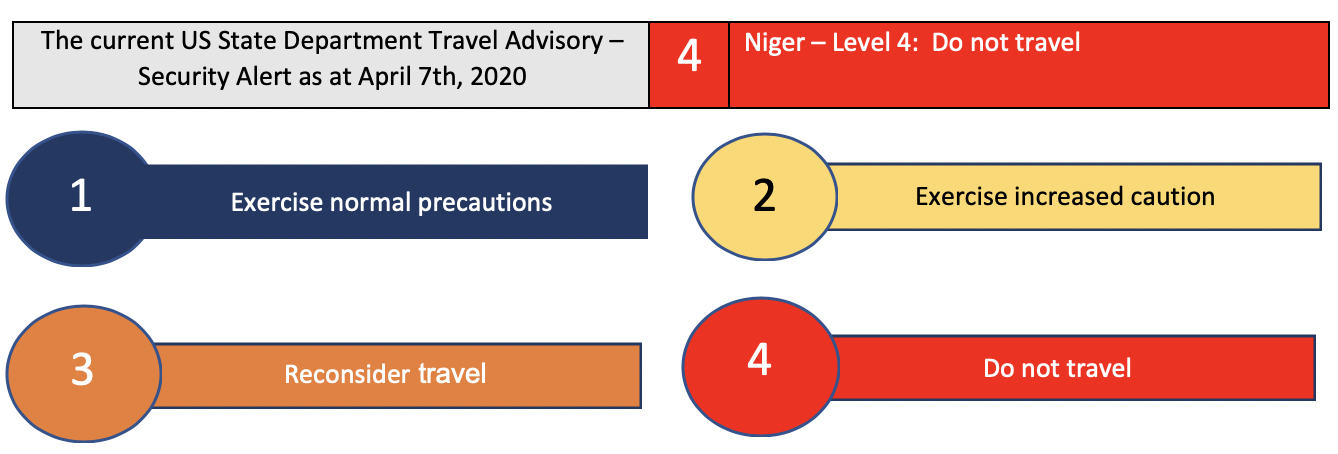
Global Health Advisory
The Department of State advises U.S. citizens to avoid all international travel due to the global impact of COVID-19. In countries where commercial departure options remain available, U.S. citizens who live in the United States should arrange for immediate return to the United States, unless they are prepared to remain abroad for an indefinite period.
At present the Department of State is making every effort to assist U.S. citizens overseas who wish to return to the United States. As the Covid-19 situation develops, our ability to provide such assistance working with commercial airlines or arranging for evacuation flights may become more limited or even unavailable. In recent weeks, commercial airlines have significantly reduced flight schedules and countries have closed airports and borders with little advance notice. If you wish to return to the United States, you should make arrangements to do so now and contact the nearest U.S. Embassy or Consulate for assistance as needed. There is no guarantee that the Department of State will be able to continue to provide repatriation assistance and transportation options to the United States may be unavailable in the future. If you choose to remain overseas, you should be prepared to remain where you are for the foreseeable future.
U.S. citizens who live abroad should avoid all international travel. Many countries are experiencing COVID-19 outbreaks and implementing travel restrictions and mandatory quarantines, closing borders, and prohibiting non-citizens from entry with little advance notice. Airlines have cancelled many international flights and several cruise operators have suspended operations or cancelled trips. If you choose to travel internationally, your travel plans may be severely disrupted, and you may be forced to remain outside of the United States for an indefinite timeframe.
On March 14, the Department of State authorized the departure of U.S. personnel and family members from any diplomatic or consular post in the world who have determined they are at higher risk of a poor outcome if exposed to COVID-19 or who have requested departure based on a commensurate justification. These departures may limit the ability of U.S. Embassies and consulates to provide services to U.S. citizens.
If you decide to travel abroad or are already outside the United States:
- Consider returning to your country of residence immediately using whatever commercial means are available.
- Have a travel plan that does not rely on the U.S. Government for assistance.
- Review and follow the CDC’s guidelines for the prevention of coronavirus.
- Check with your airline, cruise lines, or travel operators regarding any updated information about your travel plans and/or restrictions.

NIGER INCIDENT MAPPING
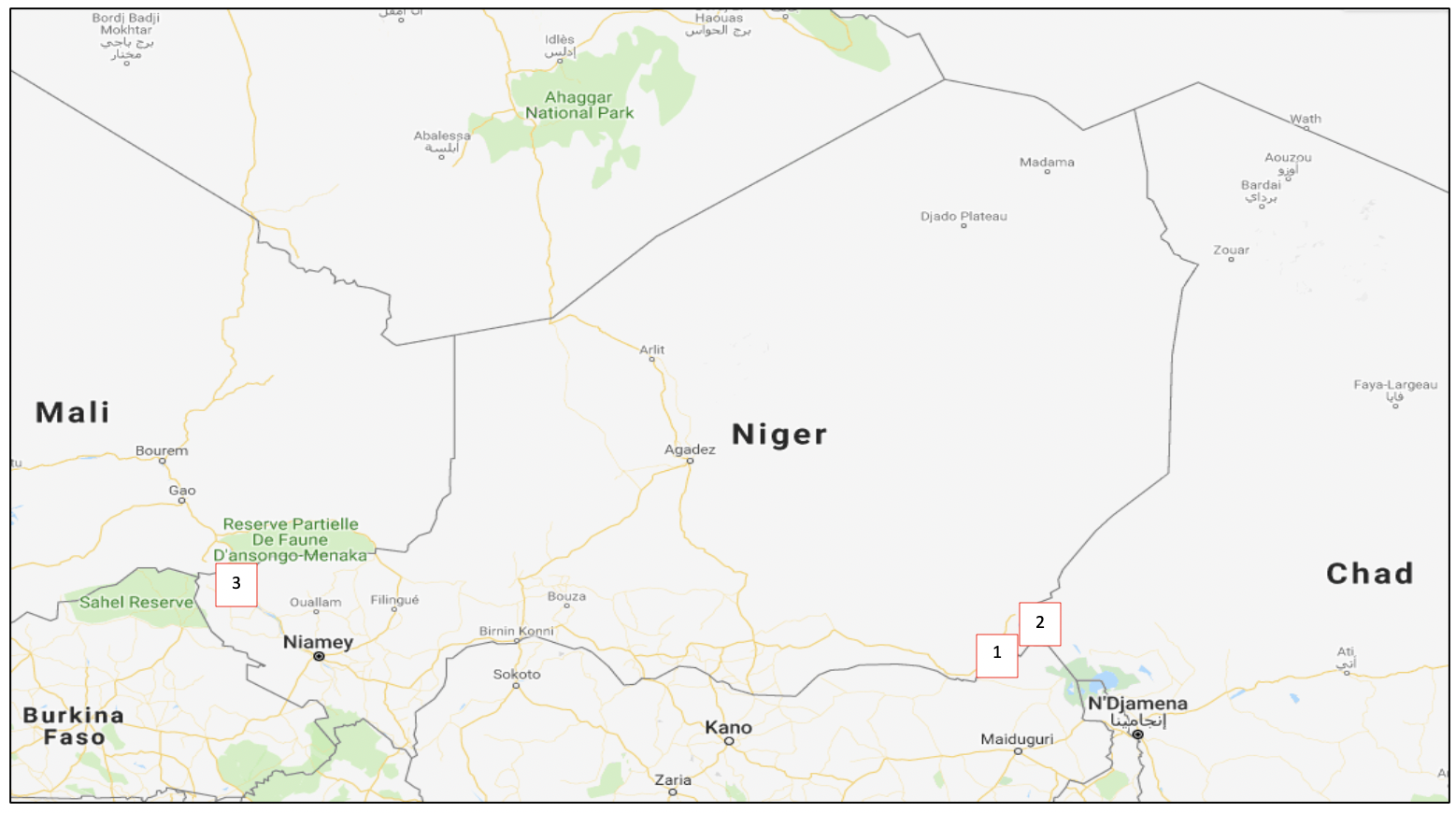
NIGER INCIDENTS IN DETAIL
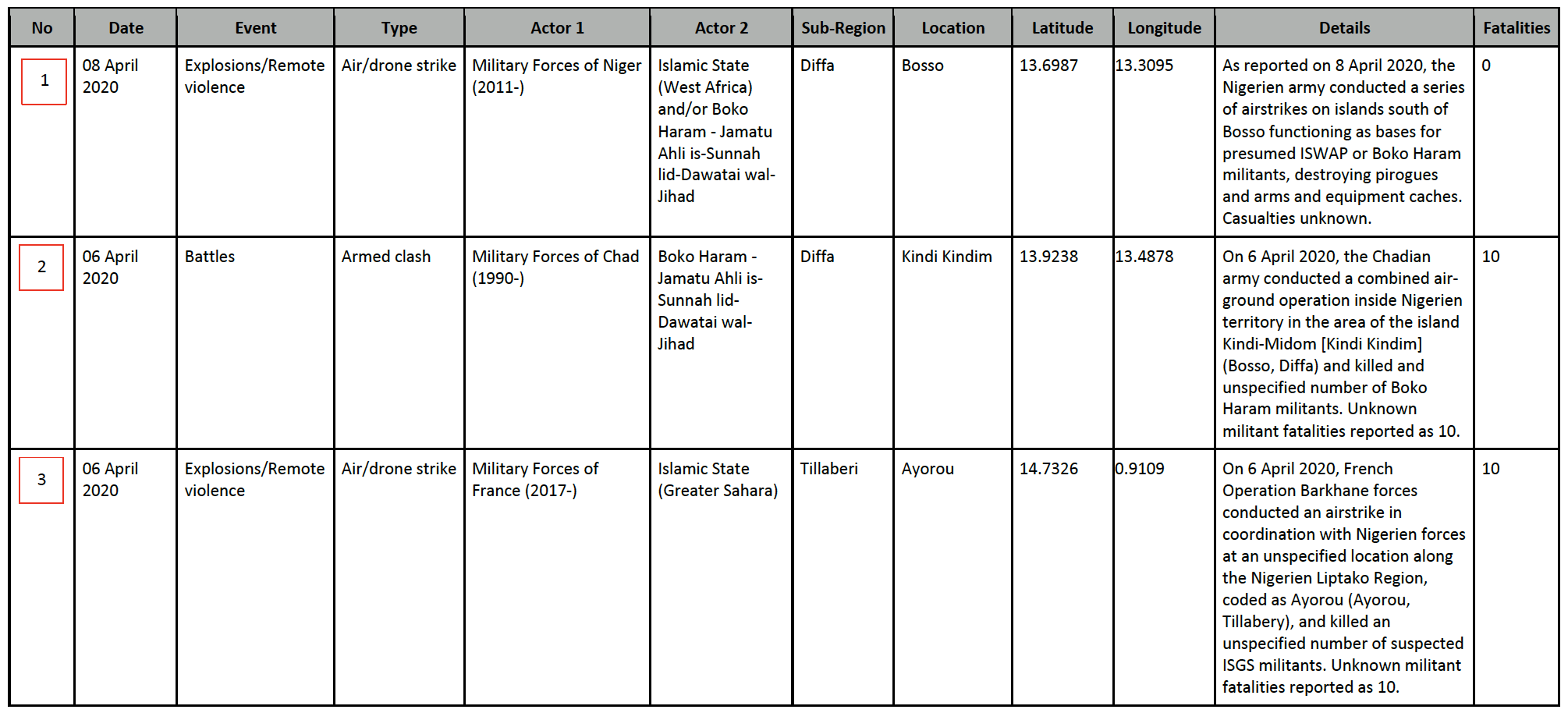
U.S. Military Cutting Medevac Flights for Troops in West Africa
The United States military is sharply reducing its emergency casualty evacuation services in West Africa, raising concerns that American troops on missions there could be left vulnerable if they run into trouble at a time when violence is surging in that corner of the continent. The action by the Pentagon’s Africa Command comes shortly after U.S. military advisers accompanied forces in Niger last month on a major counterterrorism operation near Diffa, a small town on the border with Nigeria that has been a hot spot for attacks by the militant group Boko Haram.
It was the first time American forces in Niger had joined a combat mission alongside their local counterparts since 2017, when U.S. commanders imposed strict guidelines on ground forces. Those new restrictions were imposed after an ambush in October that year near the border with Mali that left four American soldiers dead. At issue now is the military’s decision to cancel a $23 million annual contract with Erickson, an aviation services company that flies logistics and casualty evacuation flights for Army Green Berets who have been training and advising Nigerien troops for two years in Arlit, a remote city in northern Niger. The Nigerien troops have been conducting operations to intercept terrorists as they flow in and out of Libya.
But that mission has faded. The Green Berets, members of the 20th Special Forces Group from Alabama, are moving some 500 miles southwest of Arlit to carry out a higher-priority mission to help confront a toxic mix of Islamic State and Al Qaeda fighters in the tri-border region of Mali, Burkina Faso and Niger. The Africa Command says it already has enough medevac support for that area and no longer needs Erickson’s two Bell 214ST helicopters. But some lawmakers and military officials voice concern that the responsibility for handling any casualty evacuation flights will now fall on a single H225 Super Puma helicopter operated from Niamey, Niger’s capital, by another contractor, Berry Aviation. Erickson and Berry currently back up each either if their aircraft cannot fly for mechanical or other reasons.
POLITICAL OVERVIEW
To protect you from COVID-19, the Government adopted and published a battery of 26 measures from March 13 and 17, 2020. Since these dates, the pandemic has continued to progress and our country, which was hitherto spared, now counts, as of today, ten (10) cases including one death. This deterioration in the health situation proves, if need be, that the Government, in anticipation, has shown perspicacity. It is the place to greet and thank all those who, through their mobilization in raising awareness, contribute to the implementation of the measures taken, in particular traditional and religious leaders, leaders of political parties and civil society organizations . They have shown that they care about your health, our health. I ask you again to mobilize all of you, to stand up as one man to overcome this evil, the consequences of which on the human, economic and social levels are already dramatic.
Statement by the Islamic Council of Niger on the fight against Covid-19: The Council urges the faithful to observe, during the blessed month of Ramadan, the preventive measures decreed by the authoritiesOn the eve of the blessed month of Ramadan Al-Karim, the Islamic Ummah of Niger and around the world is preparing to observe this 4th pillar of Islam in a new context of restrictions and deprivation of a happy life for the whole of humanity. The only cause at the base of our total confinement having as corollary, the state of health emergency on the whole of the national territory, the suspension of the attendance of the mosques of prayers of Friday and those of daily collective prayers, the prayers of the Ramadan month, our eating habits and the survival of others. Aware of the fact that free access to places of worship (Friday mosques and those of daily prayers) and especially mass supererogatory prayers during Ramadan, the Islamic Council of Niger extended to regroupings of Islamic associations (CASIN, FAICAD, Coordination , AIN) and Ulémas du Niger ask the entire population of Niger to show endurance and to refrain from gathering in order to protect themselves and others.
The President of the Republic, Head of State, HE Mr. Issoufou Mahamadou, visited on Monday morning, April 14, 2020, the stores of the Office des Produits Vivriers du Niger (OPVN), located in the Lazaret district of Niamey, where he noted that this office is ready for the start of the Operation sale at moderate prices of cereals. Responding to the press at the end of this visit, President Issoufou Mahamadou wished to recall that faced with the consequences of the Covid-19 coronavirus pandemic, the Government designed and implemented a response plan with three components: health , social and economic. On the health aspect, the Head of State took the opportunity “to congratulate our people who are implementing and who respect, with great courage, the health measures decreed by the Government. “Our people have understood that these measures comply with religious standards,” said the President of the Republic.
